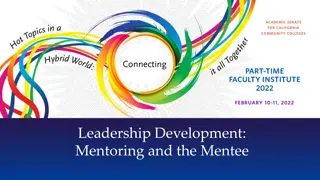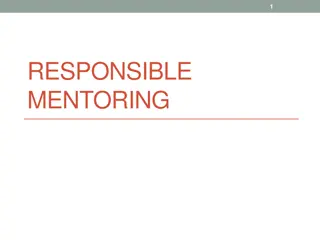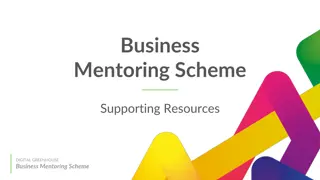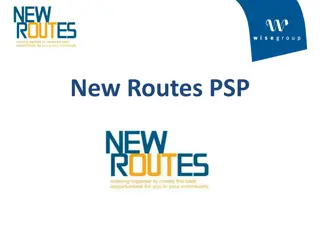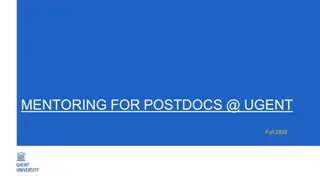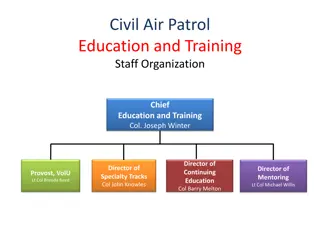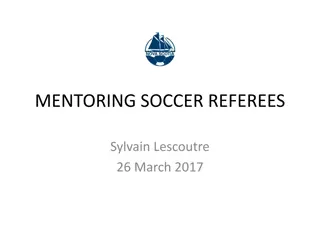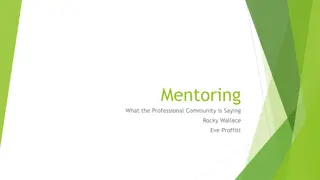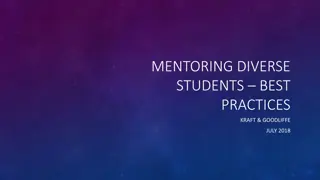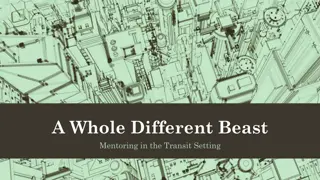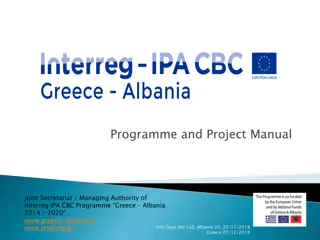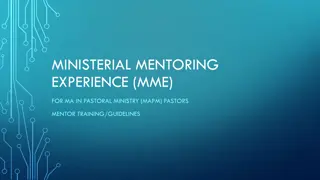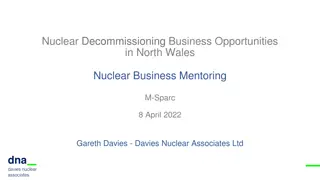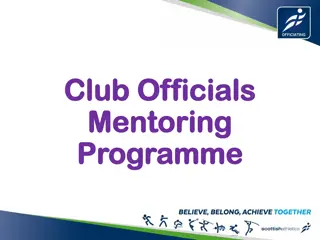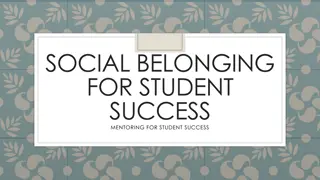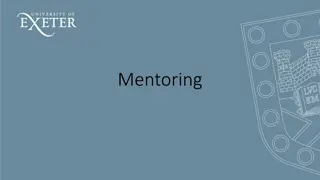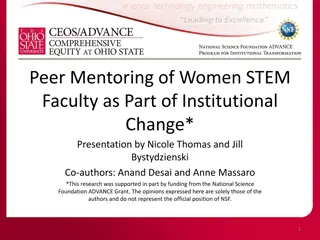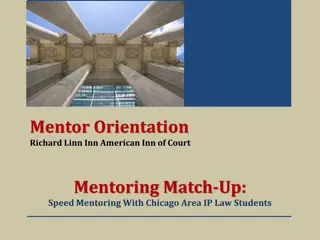
Structured Mentorship Programme 2020-2021 | Guidelines, Challenges & Virtual Events
Explore the structured mentorship programme for 2020-2021, including challenges faced during Covid-19, guidelines for mentors, virtual events, and the role of mentors. Learn how trust and confidentiality are vital for successful mentoring relationships, along with tips for both mentors and mentees. Join us for virtual meetings, online activities, and a closing event in April 2021.
Download Presentation

Please find below an Image/Link to download the presentation.
The content on the website is provided AS IS for your information and personal use only. It may not be sold, licensed, or shared on other websites without obtaining consent from the author. If you encounter any issues during the download, it is possible that the publisher has removed the file from their server.
You are allowed to download the files provided on this website for personal or commercial use, subject to the condition that they are used lawfully. All files are the property of their respective owners.
The content on the website is provided AS IS for your information and personal use only. It may not be sold, licensed, or shared on other websites without obtaining consent from the author.
E N D
Presentation Transcript
Welcome to the 2020-2021 Structured Mentorship Programme Overview of the Mentorship Programme Challenges of Mentoring through Covid-19 Some guidelines for Mentors Resources for Mentors The desired outcome for the mentees
Overview of Programme Virtual launch event Online activities for mentees arranged by the Careers Service and Alumni Relations Virtual coffees encourage mentees to have a minimum of three ideally 5 virtual meetings Work shadow day during Covid-19 Ensure you are following Government guidelines Mentors will be invited along to virtual Closing Event Closing event in April 2021
Guidelines for Mentors Virtual meetings via Zoom, MS Teams, Skype, Facetime, Google Hangouts etc. Encourage the mentee to prepare in advance of your meetings E.g. emailing you in advance with any questions/challenges they have The mentee should take ownership of the process e.g. to contact you at latest 24 hours before meetings to confirm their attendance Have a plan for communicating agreed in advance e.g. what happens if one or other of you has to change the time/date of a meeting Vital to ensure Contracting up front and setting the expectations of both parties can avoid misunderstandings arising Explain that there may be a degree of discomfort at times as they expand their Comfort Zone. Do remember while these guidelines may assist the process each individual is unique, so don t be afraid to make any amendments you think will benefit your mentee!
Guidelines for Mentors Trust is vital to the successful mentoring relationship Confidentiality must be discussed and observed by mentor and mentee The key messages: You know what you are doing You are confident in the process The mentee is safe in your hands Remember although you may not be experienced as a mentor this in an invaluable experience for your mentee Some mentors may be working with students outside their own discipline Make sure that your mentee understands the value of the experience Mentee should contact you to arrange meetings may be useful to diary them all in advance You should make contact with the mentee if you don t hear from them Escalate to the Alumni Office if there has been no contact
Resources for Mentors Feedback from past programmes suggests that new mentors have some concerns For new mentors, there is help available through the Alumni Relations office should you need support we have a number of people available to act as a sounding board Mentors may sign up for a mentor of their own at any point during the programme by giving your details to the Alumni Relations Office who will give you contact details of your mentor - you may contact them at any stage throughout the process It may be just a one off contact or you may wish to have a few calls with your mentor Should you be available to mentor a new mentor please give your name to Alumni Relations
Relationship between goal clarity and rapport in Mentoring relationship High Clarity Open dialogue Shared expectations Openness to mutual benefit Sense of urgency Task Focussed Debate rather than dialogue High Rapport Low Rapport Friendship Lack of direction Opportunistic in dealing with issues Short term perspective but . May be long term relationship Going through the motions Low Clarity (Clutterbuck & Ragins)
Outcomes for Mentees The Careers Service have introduced a Learning agreement the mentee will complete a form which you will discuss agreeing to the broad parameters This covers what have been identified as important skills for the mentee By the end of the programme the mentee will be expected to have completed a reflective journal on their mentorship experience. In addition they should complete a minimum of two of the following: Work Shadow Day CV Interview Skills Career Action Plan Mentors will sign off to that effect at the end of the programme
Work Shadow Day during Covid-19 Ensure you are adhering to Government guidelines that will apply at the time There is an opportunity to be creative around this as it may not be possible to bring your mentee into your workplace Consider setting up some virtual meetings with some colleagues approximately half an hour for each They may wish to have an hour with someone in their specific area of interest Virtual meetings can be intense - consider 3 4 meetings in a day It may stretch to a second session If this is not possible arrange with your mentee to offer something of value to them perhaps your HR dept could offer mock interview with some feedback or psychometric testing Check with your mentee when they have exams or important assignments to avoid unnecessary pressure
Some Pitfalls to Avoid Placing yourself under too much pressure Too much pressure reduces your resourcefulness Having an agenda Strategising (I know what I want them to do fixing the mentee) Allowing the idea of mentoring suggest superiority or prestige Consider if the relationship is more of a privilege for you or your mentee! Low levels of engagement Consider the component parts: Intellectual, Emotional and Enabling Avoid creating dependency/mutual dependency Mentor likes to feel needed mentee likes feel good factor I d be lost without my mentor
Avoiding Pitfalls Key to avoiding the pitfalls is self awareness Reflection is a very useful tool Consider keeping a journal very useful for new mentees Prepare in advance of your meeting Reflect as soon as you can after the meeting Check in regularly with your mentee to see how mentoring is working for them Refer to the mentor guidelines document
Questions Should you have any questions, they can be addressed at the launch event If you have a question following the launch, your first point of contact should be the Alumni Relations Office



